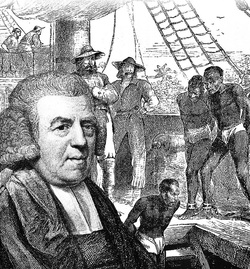
er age of 23, Newton was already guilty of perpetrating more vile atrocities than several men might have done who had lived to 70 years of age. But in that raging storm of 1748, and facing certain death, Newton suddenly cried out to God for mercy whilst wondering what mercy there could be for such a rotten man as he, for from his youth he had been a rebellious son, a dishonest, vain seaman, and was guilty of violently violating countless women. Yet God answered his cry and the storm calmed. Sensing the hand of God upon him, this hardened sinner with a heart as black as black could be, began to seek the living God and sometime later, bowed his knee at Calvary. Newton ceased his seafaring and became Tide Surveyor of Liverpool harbour, which gave him an opportunity of coming under the preaching of both George Whitfield, and John Wesley, and by 1764 he was ordained and a curate of the parish of Olney. It was there in Olney, that the form of song called a ‘Hymn,’ was first inspired and formed by Newton and his neighbour, William Cowper. The intention of a hymn was to write measured songs filled with doctrine, set to folk tunes or readily known tunes, or easily learnt tunes, so that the illiterate might learn doctrine and be inspired to worship.
In 1779, Newton was moved to a London parish where influential politicians such as William Wilberforce, came under the sound of his teaching, and through Wilberforce, Newton saw God graciously answer his prayer to reverse the slave laws through which he had so prospered in sin. The Hymn,“Amazing Grace”, is really an autobiographical poem by John Newtown. It is his testimony in verse. Towards the end of his life he often told his audiences, “My memory is nearly gone but I can remember two things; that I am a great sinner and that Christ is a great Saviour.” His tombstone reads: “John Newton, clerk, once an infidel and libertine, a servant of slaves in Africa, was by the rich mercy of our Lord and Saviour, Jesus Christ, preserved, restored, pardoned and appointed to preach the faith he had longed to destroy.”
That saved a wretch like me.
I once was lost but now am found,
Was blind, but now I see.
T'was Grace that taught my heart to fear.
And Grace, my fears relieved.
How precious did that Grace appear
The hour I first believed.
Through many dangers, toils and snares
I have already come;
'Tis Grace that brought me safe thus far
and Grace will lead me home.
The Lord has promised good to me.
His word my hope secures.
He will my shield and portion be,
As long as life endures.
Yea, when this flesh and heart shall fail,
And mortal life shall cease,
I shall possess within the veil,
A life of joy and peace.

 RSS Feed
RSS Feed